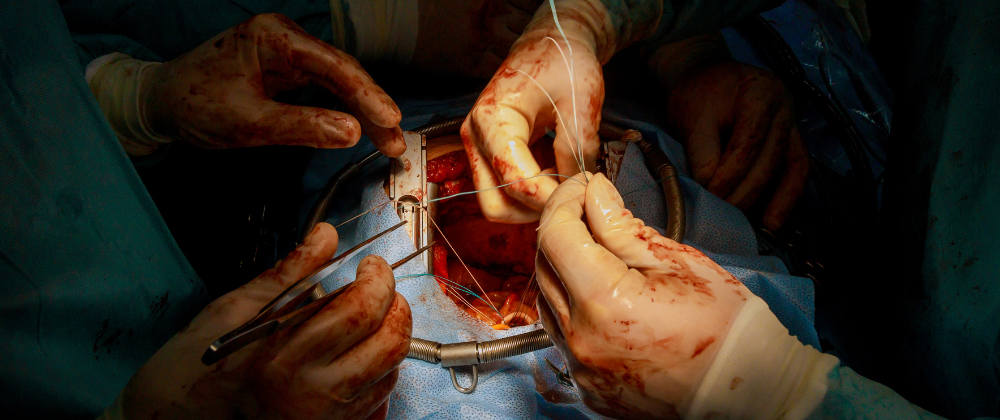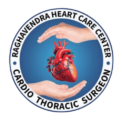Mitral Valve Replacement
Appointment Form

Dr. Raghavendra Murthy
MBBS, MS - General Surgery, MCh - Cardio Thoracic and Vascular Surgeron

Best Mitral Valve Replacement in Bangalore
Mitral valve replacement is a critical procedure for treating mitral valve dysfunction, providing relief for patients with severe heart valve disease. This surgery can involve either mechanical valve surgery or tissue valve surgery, depending on the patient’s condition and preferences. In Bangalore, Dr. Raghavendra Murthy is a highly experienced specialist, offering expert care and advanced surgical options to ensure the best outcomes for patients.
The procedure involves replacing the damaged mitral valve to restore normal heart function. While the surgery offers significant benefits, it carries risks such as infection, bleeding, and complications from anesthesia. Recovery times can vary, with patients typically needing post-surgery care and regular follow-ups. For those seeking heart surgery in Bangalore, understanding the alternatives and risks is crucial to making an informed decision.
What is Mitral Valve Replacement ?
Mitral Valve Replacement (MVR) is a surgical procedure performed to treat severe mitral valve disease, where the mitral valve in the heart is damaged or malfunctioning. This condition can lead to symptoms such as shortness of breath, fatigue, and heart failure. The surgery involves removing the damaged valve and replacing it with a prosthetic valve, which can be either mechanical or biological (tissue) in nature. MVR is necessary when the mitral valve’s dysfunction—due to conditions like mitral stenosis or mitral regurgitation—causes significant impairment of heart function and affects a patient’s quality of life, helping restore normal blood flow and relieve symptoms.
Why It's Done
Mitral valve replacement is performed to treat valve dysfunction that may cause valve regurgitation or heart valve disease. In cases where mitral valve repair isn’t sufficient, a replacement becomes necessary. Mitral valve dysfunction can lead to blood flow issues, placing strain on the heart, and potentially leading to severe complications if untreated.
Risks of the Procedure
Like any open-heart surgery, mitral valve replacement carries risks, which can include infection, bleeding, blood clots, and complications from anesthesia. However, advancements in minimally invasive valve surgery have significantly reduced these risks. The choice of valve—whether mechanical or tissue—also influences the type of post-surgery care required. Patients undergoing mechanical valve surgery often need long-term anticoagulation therapy, whereas tissue valve surgery may require fewer medications but may necessitate replacement after a period.
What You Can Expect
Before the Procedure
Your cardiac surgeon, such as Dr. Raghavendra Murthy, will conduct a detailed assessment, including imaging tests to evaluate the severity of your heart valve dysfunction. Pre-surgery preparation often involves medication adjustments and dietary changes.
During the Procedure
The surgery typically involves a sternotomy (opening the chest), allowing the surgeon to access the heart and replace the malfunctioning valve. For those undergoing minimally invasive valve surgery, smaller incisions may be used, reducing recovery time.
After the Procedure
Post-surgery, patients are usually placed in intensive care for monitoring, followed by a hospital stay of several days. Recovery includes physical therapy, diet changes, and medication management to prevent clot formation, especially for mechanical valve surgery patients. Heart surgery recovery varies, but most patients can resume daily activities within a few months.
Results and Recovery
Heart valve replacement effectively restores heart function and significantly improves quality of life. Long-term outcomes depend on the type of valve used and adherence to post-surgery care, including regular follow-ups. Recovery also involves managing blood-thinning medications and lifestyle adjustments to ensure optimal cardiovascular health.
Alternatives to Valve Surgery
For certain cases, mitral valve repair may be an alternative to a full replacement, particularly for those with less severe valve issues. This procedure is often less invasive and has a shorter recovery period. Other non-surgical options, such as medication to manage symptoms, may be recommended if surgery is high-risk for the patient.
Treatment Options for Mitral Valve Surgery
When it comes to mitral valve surgery, there are several treatment options available, each tailored to the specific needs of the patient. The most common options include:
If the mitral valve is not severely damaged, a mitral valve repair surgery may be an option. This involves fixing the valve to restore its proper function, rather than replacing it entirely. Repairing the valve has the advantage of preserving the patient’s natural valve and generally requires a shorter recovery time.
In cases where the valve is too damaged to be repaired, a mitral valve replacement is necessary. This involves removing the diseased valve and replacing it with a mechanical valve or biological (tissue) valve. A mechanical valve is durable but requires lifelong blood thinner medication, while a biological valve typically made from animal tissue, may need to be replaced after 10-20 years but doesn’t require long-term anticoagulation therapy.
For some patients, a minimally invasive mitral valve surgery can be performed, which involves smaller incisions and can lead to quicker recovery times and less post-operative pain. This option is typically available for patients who are candidates for repair or valve replacement.
For patients who are not candidates for traditional surgery, TMVR is a less invasive option. It involves using a catheter to repair the valve via small incisions, reducing the risks and recovery time associated with open-heart surgery.
In some cases, other options, such as stenting or angioplasty, may be recommended instead of CABG. Consulting with a cardiologist can help determine the most effective surgical cardiac care option based on individual health needs.
Each treatment option has its own set of benefits, risks, and recovery timelines, which should be discussed in detail with a heart surgeon. For patients seeking mitral valve surgery in Bangalore, selecting an experienced cardiothoracic surgeon like Dr. Raghavendra Murthy ensures the best treatment plan tailored to the individual’s health needs.
Conclusion
mitral valve surgery offers several treatment options, including mitral valve repair, mitral valve replacement, and minimally invasive techniques, each designed to address the severity and nature of the valve dysfunction. The choice of treatment depends on factors like the patient’s overall health, the degree of valve damage, and the surgeon’s recommendations. Mitral valve replacement remains a key solution for patients with severe mitral valve disease, offering significant relief and improved heart function. For those seeking the best care in Bangalore, consulting with an experienced specialist like Dr. Raghavendra Murthy ensures a tailored approach, helping patients navigate their treatment options and achieve the best possible outcomes.
Frequently Asked Questions
Mitral valve repair fixes the damaged valve, preserving the natural tissue. In contrast, mitral valve replacement involves substituting the valve with a mechanical or tissue valve.
Recovery typically takes a few months, depending on factors like age, overall health, and the surgical approach.
Yes, maintaining heart health through diet, exercise, and medication adherence is crucial for recovery and long-term wellness.
Most patients report manageable pain after surgery, which is typically controlled with pain medication. Minimally invasive surgery may also result in less postoperative pain compared to traditional open-heart surgery.
Most patients are able to return to normal activities within a few months, though heavy lifting or strenuous exercise may need to be avoided initially. Follow-up with your doctor is essential to ensure proper recovery.
Yes, there is a risk of infection after surgery, including endocarditis (infection of the heart lining). Taking proper precautions, following post-surgery instructions, and taking antibiotics as prescribed can reduce this risk.
